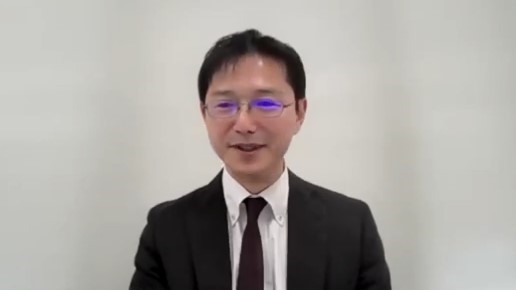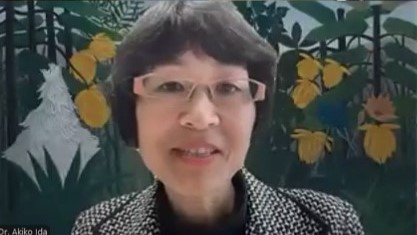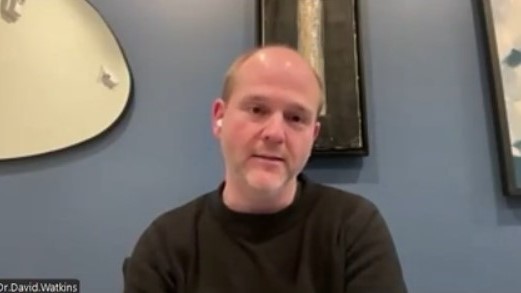Seminar Held for “Invisible Gaps: Addressing the Financial Burden of Cancer Care toward Universal Health Coverage”
2025.05.22
On April 11, 2025, the JICA Ogata Sadako Research Institute for Peace and Development (JICA Ogata Research Institute) hosted a webinar titled “Invisible Gaps: Addressing the Financial Burden of Cancer Care toward Universal Health Coverage.” The session brought together leading global health experts to explore the effects of cancer-related financial hardship and efforts to achieve universal health coverage (UHC), with a focus on systemic inequities, measurement approaches, and policy design.
Moderator Takizawa Ikuo , Principal Research Fellow at the JICA Ogata Research Institute, opened the event by noting the growing crisis of cancer care in low- and middle-income countries (LMICs). He articulated how long-term care needs—combined with fragmented health systems—create severe financial burdens for patients and households. He expressed his hope that the seminar would broaden the audience’s understanding of the intersecting economic and social challenges of cancer-related health care.

Takizawa Ikuo, Principal Research Fellow, JICA Ogata Research Institute
Ida Akiko , Associate Professor at Shimane University and Visiting Fellow at the JICA Ogata Research Institute, began her talk by pointing out, “Cancer is a poverty issue.” Presenting research in sub-Saharan Africa, she emphasized the social and financial implications of the cancer epidemic in LMICs. By 2030, three-quarters of global cancer deaths are expected to occur in LMICs, with rising incidence under the age of 65. Ida pointed out that the benefits of technological advances and cancer-related research remain concentrated in high-income countries, leaving critical gaps in knowledge and access across low-resource settings.
Ida introduced the concept of “financial toxicity”—a term she defined as a combination of the direct and indirect financial burden, and psychosocial distress owing to the costs associated with cancer treatment. She revealed catastrophic health expenditures in 86–95% of households in countries like Nigeria, with some families spending over USD 5,000 per year on treatment, transportation and other expenses out of pocket. Ida’s ethnographic fieldwork in Burkina Faso highlighted how social vulnerability increases the health and financial burden and vice versa—especially for rural, low-income households and those affected by conflict. She called for integrating cancer control measures into UHC efforts and strengthening financial protection for patients. She concluded her presentation with a call to “listen to the voices of patients and families” and expand research on cancer care in low-income countries to better inform health policy.

Ida Akiko, Associate Professor, Shimane University / Visiting Fellow, JICA Ogata Research Institute
Beverley Essue , Associate Professor in Global Health Systems at the University of Toronto, provided a global overview of financial protection for cancer care, emphasizing the importance of definitions, metrics, and tools. She noted that even in countries with UHC, cancer patients often face catastrophic health expenditures and medical impoverishment. Drawing on studies from ASEAN countries and India, Essue illustrated how financial hardship and cost-related nonadherence occur across diverse health system contexts.
Essue detailed the conceptual framework used to assess cancer costs, including direct cost (medications, treatments, etc.), indirect cost (loss of income, etc.), and psychosocial cost (anxiety, the impact on family relationships, etc.). She outlined key indicators such as catastrophic health expenditure and medical impoverishment and noted inconsistencies in measurement methods across studies. There are now dedicated tools for assessing out-of-pocket costs, such as cost diaries and the COST (Comprehensive Score for Financial Toxicity) tool—a validated measure of financial toxicity. She concluded by recognizing the need for methodological consistency, innovations in measurement, and communities of practice—collaborative networks that drive knowledge sharing and learning— to better capture the full economic burden of cancer.

Beverley Essue, Associate Professor, Global Health Systems, University of Toronto
David Watkins , Associate Professor of Medicine and Global Health at the University of Washington, presented innovations in Extended Cost-Effectiveness Analysis (ECEA). He acknowledged the limits of conventional cost-effectiveness analysis (CEA), which tends to prioritize interventions based solely on health gains. In contrast, ECEA incorporates financial risk protection and equity into modeling health interventions—key dimensions of UHC.
Watkins described how ECEA can inform the design of health benefits packages by analyzing both health outcomes and the number of cases of medical impoverishment averted. He presented analyses of 16 cancer interventions for a hypothetical low-income African country. While some treatments, like cervical cancer care, were both cost-effective and protective against impoverishment, others (e.g., stomach or ovarian cancer) showed weaker cost-effectiveness but provided substantial financial protection. He demonstrated how dynamic modeling tools can help countries evaluate trade-offs between increased coverage and reducing out-of-pocket payments.

David Watkins, Associate Professor, Medicine and Global Health, University of Washington
Following the presentations, Yoshida Tomoya, Senior Deputy Director General of the Human Development Department at JICA, provided a brief commentary. He explained that JICA’s involvement in cancer-related cooperation has been limited to date, as projects are driven by requests from counterpart governments, but observed that rising cancer burdens may lead to more such requests in the future. JICA has supported infrastructure and health human resources in countries like Vietnam, Palestine, and Moldova. He noted that while JICA’s support has focused on infrastructure and training, the issue of financial barriers is also an important consideration for improving access to cancer services. He welcomed the insights presented, particularly around positioning cancer services within health financing systems, stressing the need for incorporating these perspectives into future program design.

Yoshida Tomoya, Senior Deputy Director General, Human Development Department, JICA
A video recording of this seminar can be watched from the link below.

事業事前評価表(地球規模課題対応国際科学技術協力(SATREPS)).国際協力機構 地球環境部 . 防災第一チーム. 1.案件名.国 名: フィリピン共和国.

事業事前評価表(地球規模課題対応国際科学技術協力(SATREPS)).国際協力機構 地球環境部 . 防災第一チーム. 1.案件名.国 名: フィリピン共和国.

事業事前評価表(地球規模課題対応国際科学技術協力(SATREPS)).国際協力機構 地球環境部 . 防災第一チーム. 1.案件名.国 名: フィリピン共和国.

事業事前評価表(地球規模課題対応国際科学技術協力(SATREPS)).国際協力機構 地球環境部 . 防災第一チーム. 1.案件名.国 名: フィリピン共和国.

事業事前評価表(地球規模課題対応国際科学技術協力(SATREPS)).国際協力機構 地球環境部 . 防災第一チーム. 1.案件名.国 名: フィリピン共和国.
scroll